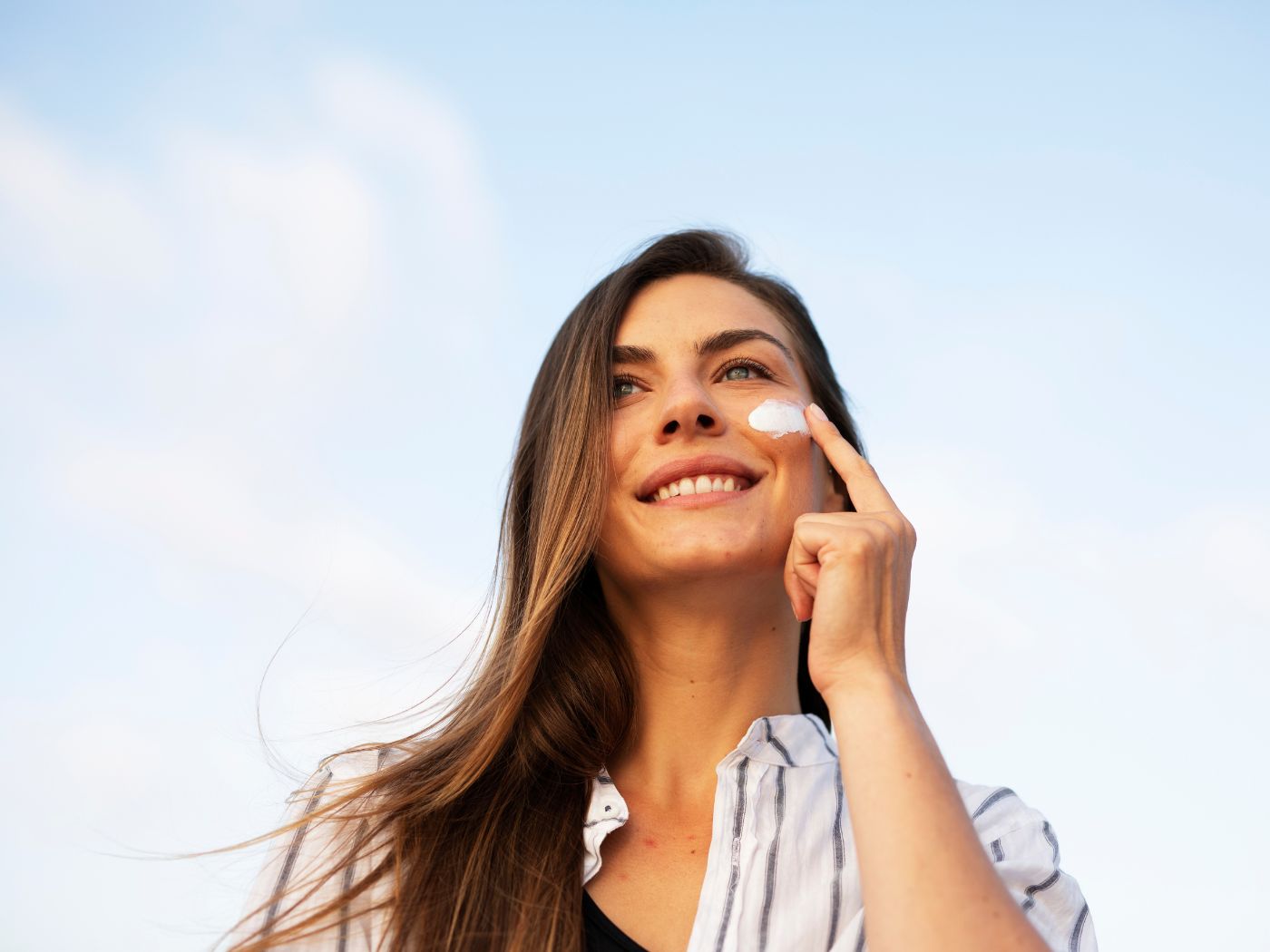- Basics Of Sunscreen
- Why Is Sunscreen Essential For All Weather?
- Benefits Of Using Sunscreen
- Using The Right Sunscreen For Your Skin Type
- FAQs
We all know the sunscreens benefits. They help in protecting our skin from UV protection. But it is vital to understand the importance of UV protection in all weather. Today, we will learn about the significance of wearing sunscreen in all weather conditions, how to get skin protection beyond sunny days and also look at different sunscreens for cloudy weather!

Basics Of Sunscreen
Before talking about why sunscreen is crucial for skin protection in all seasons, we first must understand the basics of sunscreen. Sunscreen is a skin care product used to protect the skin from the sun’s harmful UV rays. There are two different types of sunscreens - chemical and physical. While the chemical sunscreen absorbs the UV rays to protect the skin, physical sunscreens create a barrier that reflects and scatters the rays. The strength of sunscreen is typically determined with the help of its Sun Protection Factor or SPF. The SPF also helps in understanding the impact of weather on UV radiation and sunscreen use.
SPF measures the sunscreen’s ability to protect your skin against UV B rays that cause sunburn. When searching for sunscreen, it is always advisable to look for a broad-spectrum sunscreen that can shield you against UVA and UVB rays. This protection is because of the active ingredients present in the sunscreen that includes avobenzone, octinoxate and zinc oxide.
It is important to understand that sunscreens can only reduce the risk of sun-related damage such as skin cancer and premature ageing. However, no sunscreen can offer 100% protection. You should apply sunscreen generously over your exposed skin to reduce the risk of any damage. One of the common misconceptions is that sunscreen should only be used in sunny weather. However, skin protection beyond sunny days is as important as skin protection during sunny days.

Why Is Sunscreen Essential For All Weather?
We know about the sunscreen benefits, but do you know your skin needs UV protection in all weather? Here is why you should use sunscreen for cloudy weather and every other weather.
-
UV Protection:
Even on overcast days, UV rays can still reach your skin and cause damage. While the visible light is blocked by the clouds, the UV rays, that aren’t visible to the bare eye, can penetrate to cause harm.
-
UVA Rays:
UVA rays are responsible for the majority of skin problems caused by UV exposure. They can cause long-term skin damage such as wrinkles, fine lines, and sunspots, and can present throughout the year in all weathers.
-
UV Reflection:
The UV rays can also be reflected through reflective surfaces such as snow, sand, water, etc. to cause UV damage.
-
Sun Exposure Duration:
The sun damage is also affected by the exposure duration. The cumulative effects of sun exposure over time can lead to severe skin damage and an increased risk of skin cancer.
-
Skin Health And Ageing:
Sunscreen helps protect your skin from UV damage and maintains a healthy and youthful-looking screen. Overexposure to UV rays can cause premature ageing, including wrinkles, uneven skin tone, etc., in all weathers.
Now that we know the importance of UV protection in all weather, let’s take a look at the sunscreen benefits in detail. 
Benefits Of Using Sunscreen
There are several sunscreen benefits for our skin health and sun protection. Here are some key noteworthy benefits of using sunscreen:
-
UV Radiation Protection:
Sunscreen acts as a shield to protect your skin against harmful UV rays, prevents sunburns, and reduces the risk of skin cancer by minimising sun-induced damage.
-
Prevention of Premature Ageing:
UV exposure accelerates the ageing process, leading to wrinkles, fine lines, and age spots. Regular sunscreen use safeguards against UVA rays, which cause premature ageing, helping maintain a youthful and healthy appearance.
-
Reduced Risk of Skin Cancer:
Prolonged exposure to UV radiation increases the likelihood of developing skin cancer. Consistent use of sunscreen significantly lowers this risk, including both melanoma and non-melanoma skin cancers.
-
Prevention of Sunburns:
Sunburns cause pain, redness, blistering, and peeling of the skin. Applying sunscreen with an adequate SPF effectively protects against sunburn, enabling enjoyable outdoor activities without harming the skin.
-
Prevention of Hyperpigmentation:
UV exposure triggers the overproduction of melanin, leading to dark spots and uneven skin tone. Sunscreen helps prevent hyperpigmentation, promoting a more even complexion and reducing the appearance of sunspots.
-
Suitable for All Skin Types:
Sunscreen benefits all skin types, including sensitive and acne-prone skin. Different formulations cater to specific needs, such as oil-free options for oily skin or gentle variants for sensitive skin.
-
Maintenance of Skin Health:
By shielding the skin from sun damage, sunscreen helps maintain overall skin health, reducing the risk of inflammation, dryness, and irritation caused by UV exposure.
Using The Right Sunscreen For Your Skin Type
Selecting the right sunscreen for different weather scenarios and skin type is important to ensure optimal protection and compatibility with your skin. Here are some tips for selecting the appropriate sunscreen based on different skin types:
-
Dry Skin:
Look for sunscreens that provide moisturising benefits, such as those labelled as "hydrating" or "moisturising." Opt for cream or lotion formulations that contain ingredients like glycerin, hyaluronic acid, or natural oils that can help nourish and hydrate your skin.
For dry skin, you can try Pure Sense Sun Care Glow Cream with SPF 50 PA+++, enriched with niacinamide and saffron extracts. This sunscreen will protect your skin and also help you achieve glowing skin naturally. -
Oily or Acne-Prone Skin:
Choose oil-free or non-comedogenic sunscreens specifically designed for oily or acne-prone skin. These formulas are lighter in texture and less likely to clog pores, helping to prevent breakouts. Look for terms like "oil-free," "non-greasy," or "non-comedogenic" on the product label. -
Combination Skin:
If you have combination skin with both dry and oily areas, consider using lightweight gel or fluid sunscreens. These formulations provide sun protection without feeling heavy or greasy on the skin. Look for terms like "lightweight" or "gel-based" on the packaging. -
Sensitive Skin:
Opt for sunscreens that are specifically formulated for sensitive skin and labelled as "gentle" or "sensitive skin-friendly." Look for products that are fragrance-free, hypoallergenic, and free from potential irritants such as dyes or alcohol. -
Fair or Light Skin:
Individuals with fair or light skin are typically more prone to sunburn. Choose sunscreens with a higher SPF (30 or above) to provide enhanced protection against UV rays. Additionally, consider using physical sunscreens containing zinc oxide or titanium dioxide, as they are less likely to cause skin irritation.
-
Darker Skin Tones:
While individuals with darker skin tones have higher natural protection against UV rays, it's still essential to use sunscreen regularly. Look for broad-spectrum sunscreens with an appropriate SPF. Mineral-based sunscreens can be a good option as they leave less of a white cast on the skin.
Conclusion
We hope to know the importance of using sunscreen in all weathers as our skin needs UV protection not just during sunny days!
FAQs
-
Is sunscreen necessary on cloudy or overcast days when the sun isn't visible?
Yes, using sunscreen is necessary on cloudy and overcast days when the sun is not visible as UV rays can penetrate the clouds to damage your skin. While the visible light is blocked by clouds, the UV rays are not and cause skin damage. -
Why is sunscreen important for people with darker skin tones?
People with darker skin tones have generally more resistant to UV radiation, but they are still susceptible to sun damage. They can also be affected by UV rays, hence requiring complete protection. Although, the type of sunscreen to use, can vary. -
What SPF level is recommended for everyday use in different weather conditions?
For everyday use, it is recommended to use sunscreen with a low SPF of up to 30. This will filter out approximately 97% of the UVB rays. However, the right sunscreen will be dependent on your skin type, location, outdoor exposure and personal preferences.







